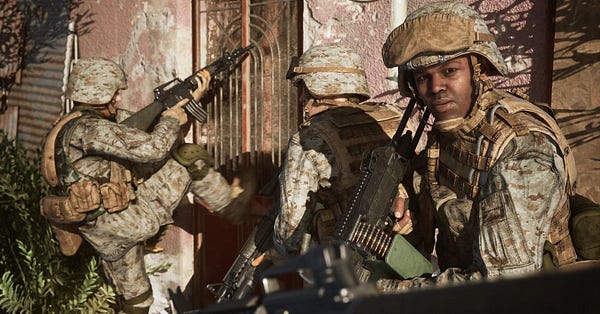It’s so predictable these days. Something controversial happens. Or maybe not that controversial but with the potential to become a controversy. Someone smells blood.
Maybe it’s a new game. Maybe it’s a person working on a TV show or at a game studio. Someone, maybe a journalist or a YouTuber or just a social media star, reveals something problematic to their followers. Like lighting a match.
You know what happens when a match is lit and tossed into such tinderous kindling as woke Twitter.
Soon, this amorphous thing begins to take shape. What was just a series of tweets or a single YouTube video is now making headlines. The journalists posting the “news” mostly just repeat what’s been said before, even if it isn’t true.
It’s so predictable. You know what the headlines will look like before they’re written.
When Troy Leavitt was dragged by the gaming press recently, one very simple untruth was told about him over and over again: That he was the lead designer on Hogwarts Legacy. This, we later learned, was not the case. He was a Senior Producer (though he had, at one point, been lead designer). The information was public. Nobody bothered to check.
If the press can’t even get this detail right, how can we trust them on all the rest? That Leavitt was “far-right” and his personal politics must make women he works with uncomfortable, or that the whole thing was a grift that he’d somehow masterminded and was on his way to fame and fortune on . . . Patreon?
Of course, none of this was true. Leavitt wasn’t “far-right” and his videos are not racist or mysoginistic. He wasn’t going on to make YouTube millions as a right-wing agitator—he was retiring and moving to a new state to help a family member in need.
If you’d like to see just how solidified this narrative had become by the time Leavitt announced his departure from Warner Bros. simply read the comment thread accompanying this Kotaku article. Not that we should ever hold comment threads to super high standards, but here are a bunch of social-justice-minded people who have fully made up their minds about the man, that he was for certain forced out of his job and that he’d for sure go on to make bank as a YouTuber and blame the Big Bad Media and cancel culture for his plight. One commenter said that Leavitt was simply facing the consequences of his actions.
What actions? Making videos you disagree with?
Leavitt did have some choice words for the media, of course: That they failed to do their core job and research the facts, even the most basic facts like Leavitt’s actual job (let alone watch the videos they lambasted him for). He did not complain about being cancelled.
It doesn’t matter. While some journalists updated their posts, most everyone else simply dropped the matter. I did not see anyone come out of the woodwork to apologize for getting it all wrong, for attempting to tarnish a man’s reputation.
When a friend sent me Rami Ismail’s tweets about Six Days In Fallujah a few days ago, he told me to hold off for a bit. The usual suspects were almost certainly sharpening their knives. Soon, others would latch on. Lo and behold, by the time I wrote my first article about the controversy, the narrative had formed. I had no shortage of material to work with. Too much, really.
It’s all just so predictable. You can map out the trajectory. We’ve been here before and we’ll be here again. It’s a loop.
What began as one game developer’s critique of a game he hasn’t played yet, soon became a resounding chorus. Six Days In Fallujah is simply too problematic to exist. It will harm people. A petition was written up which claims that the game will lead to a “new generation of mass shooters” and turn otherwise well-adjusted gamers into racists.
(I was DM’d by the petition’s author, Hala Alsalman, and we messaged privately about the game and our disagreements. I won’t go into detail, but I tried to explain that I defend free speech and free expression for the same reason I oppose war—because I am against violence, and war and censorship are both acts of violence. She was not convinced, believing that the Iraqi people have already suffered enough and that this game will lead to more suffering—something I don’t believe to be true—but I’m glad we were able to have some amicable dialogue away from the madness of Twitter. At least she had the class and decency to reach out and speak with me instead of just block me like so many others).
The petition has been widely shared by game developers, journalists and their followers, often urging people to sign it and help stop this terrible game from being made.
My second article—over at Forbes this time—argued that people were not giving the developer a fair shake and were spreading falsehoods about the game in what amounted to a smear campaign.
But it’s too late. You should have seen my Twitter timeline yesterday. It turns out that defending this game means you’re “alt-right” hate people of color and are a “dweeb.” That last one was from game journalist and former Senior Editor at GameInformer, Imran Khan who was riffing off of this disingenuous, misleading—but narrative-building!—tweet:


It’s important to note that this tweet, which has 35 retweets and 292 likes at the time of this writing, is complete and utter bullshit. Its author asserts that I yell about how nobody is complaining about Call Of Duty when this is clearly not the crux of my argument at all. I make an aside at one point, noting that all the fearmongering over this game is in a world in which Call Of Duty remains the best-selling game franchise year over year.
That aside is meant to illustrate that violent video games, and war games in particular, do not actually lead to the sky falling, to mass shootings and so forth. That’s the very obvious point I’m making—not that I’m upset that people are complaining about Six Days In Fallujah but not about Call Of Duty.
Anyways, the tweet was shared and retweeted and this person’s followers mostly didn’t bother to read it. They just assumed that the article was saying what the tweet claimed it was saying (and why shouldn’t they—though it would be nice if people read stuff before commenting for obvious reasons).
Most of the replies are mocking me in some way or mocking the article and none of them are actually addressing or engaging with the content. This is where Mr. Khan popped in to call me a “dweeb” behind my back and then, when I confronted him about it, proceed to block me. Nice guy.
Or take this person who spent a good portion of the day attacking me on Twitter, trying to get Forbes to fire me, and then questioning my lack of empathy.
You can be the judge of whether or not my reporting on this game lacks empathy. And if being a journalist is being a “keyboard warrior” okay I guess. I’ll take the one piece of advice that Adam Baldwin ever gave me: Be a happy warrior. I’ve always liked that, though it isn’t always easy.
Or here’s a long-time developer acquaintance of mine, Damion Schubert, who is far from unfamiliar with who I am given we’ve followed one another for years making a pretty far out claim:

I mean, the first paragraph of my very first article on this game includes some historical background on the battle itself, but it’s true that I didn’t discuss the massacre—a terrible war crime that took place in 2003, a year before the Second Battle Of Fallujah which took place at the end of 2004.
Of course, even the fact that the Second Battle of Fallujah was itself a bloody, awful historical reality does not have the slightest bearing on my argument: That censorship is wrong and that even bad games or games about bad things have the right to exist (so long as they’re not ripping people off or something).
If all these people upset about Six Days In Fallujah were doing was saying “this game looks terrible we won’t buy it” I wouldn’t be writing these articles to begin with. But that’s not what they’re doing, is it? And they wouldn’t have bought it anyways, would they? So they need to go one step further.


But also, it’s not about censorship.


You see, the narrative doesn’t even have to be internally consistent. We are dealing with people who say “we don’t want to censor anything” who are actively passing around a petition to have a game banned. People who say one thing and then do another—there’s a word for people like that. It’s on the tip of my brain.
Oh and here’s the consequences line again:

Making a video game that Woke Twitter doesn’t like isn’t something you should “face consequences” for any more than Troy Leavitt should face consequences for making videos Woke Twitter doesn’t like. Woke Twitter needs to stop thinking that the rest of the world should march in lockstep to their narrow-minded worldview.
On and on like this, the replies to this misleading tweet go, with the occasional Blue Checkmark chiming in with a drive-by insult. I’m not a very popular person it turns out and my colleagues are only too happy to throw me under the bus for defending something they should actually care about: Free speech.
The thing nobody talks about in all these replies? The actual article.
In it, I simply point out that contrary to the narrative, which suggests (without evidence) that the game will not tell the Iraqi side of the story, according to the developer 26 Iraqi civilians will be part of the game’s documentary portion.
But nobody, not a single person (that I’ve seen) replying to this deeply misleading tweet actually mentions any of that. They complain that I’m pushing a “cancel culture” narrative or that I refuse to engage people or that it’s so mind-numbingly awful they couldn’t read it or that I’m an idiot for making the Call of Duty comparison (that I didn’t make) and round we go. The truth is lost in a sea of bullshit and it doesn’t matter because the bullshitters have a just cause. They are the noble champions of (something that sort of bears a resemblance to) the truth.
And that’s enough.
It’s enough because the truth no longer matters once the narrative has taken shape. It doesn’t matter that my most grotesque, dare I say diabolical, suggestion so far has been “Instead of knocking it before you try it, why don’t we play the game first and then issue a verdict?”
Then we can write reviews and have a conversation about the game’s actual message and gameplay and all of that stuff.
No wonder people are misrepresenting my articles to their followers. They have no actual arguments—behold the lack of any sort of rebuttal that’s not some nasty Twitter potshot—so they tell lies instead.
Because the narrative, you see, is that this game will literally kill people and if we don’t do something to stop it we are letting people die and if you oppose efforts to cancel it (but cancel culture also doesn’t exist) you are enabling killers. Not everyone says it like that, but that’s the gist. If not “literally killing people” it will at least bring great torment to both Iraqis and veterans who, I guess, will be forced at gunpoint by the US military to play it or something?
It’s so bad faith it’s almost stunning. I felt dizzy by the time I got off Twitter last night (and not just because of the Jameson).
When you sit and think about it for any length of time, you realize that while some of these people may indeed be genuinely worried that a video game will cause harm—and maybe they’re just ignorant about the science or still live in the 90s when people thought video games cause real-world violence—many others are very purposefully lying and spreading false information. Some of these people are game devs or journalists who should know better and do know better but lack any kind of shame or professionalism.
This is how it works. You plant the narrative seed and watch it grow, branch out, blot out the sun. It will happen again with some other problematic game or person and the mob will descend. There will be blood, because this isn’t about social justice—it rarely is—it’s just blood sport. It’s just another way for this clique of sycophants to build each other up by tearing other people down. It’s bullying, plain and simple. And the end-game is censorship and the crushing of any dissent.
Social justice is about enacting real, structural change to an unjust society. One historical tool that governments have used to quash real social justice movements is censorship.
Violence begets violence. And I’ll have no part in it.
If you enjoyed this post please consider subscribing. I’ve recently opened up paid subscription options and if you want to support more of this kind of post, please considering opting for that. If not, much of the content here will remain free as well. Thanks!
You can find me on Twitter, Facebook, Instagram, or YouTube. Read my Forbes blog here.
Image by Anastasia Makarevich from Pixabay





John Mcwhorter's "Antiracism, Our Flawed New Religion" over at Daily Beast should be required reading for anyone wanting to understand this "culture" or mentality. My question is, are a lot of these folks actual true believers or are they scared of each other and therefore "sound the part" to go along and get along? I heard an interview with Alanah Pierce on YouTube about ratings for game reviews and she basically said, "reviewers aren't scared of the audience, they're scared of each other" and I wonder if there's an element of that going on here.
The apocalyptic language of doom is always to be expected. I suppose everything has to be couched in "if this happens, people will die!!!!!" or it won't be taken seriously. As a guy who's spent a fair amount of time in the world of American Evangelicalism, it is imperative for persecution to be a very real thing to scare the faithful. As a kid, I heard that the liberals would soon come to lock up Christians and put us in prison camps...it was right around the corner. Same here. As stated in the article, if this game comes out, people will DIEEEEEEEEE.....
That comment about the Fallujah massacre may be on to something important. If this is about something as simple as mistaking the 2nd Battle of Fallujah with the (rather horrific) massacre from one year before, then perhaps some of these people could be persuaded yet.
...although it probably isn't all that easy. A lot of publications may have outrage-mongering in part because that shit pays the bills. Freddie did an experiment recently where he wrote two posts saying almost the same thing, but one of them was neutral in tone while the second was combative and aggressive. According to Freddie the more aggressive one had (IIRC) triple the traffic of the milder one. Something of the same order probably holds for all the standard online magazines. Of course, Freddie didn't really say anything that's false or misleading. I guess the point where it starts crossing over into unethical territory is when the journalists start either inventing their own controversies, or repeating some abomination of a narrative that has already formed on Twitter.
But I guess the core issue is that these magazines don't want to lay off their employees. Even if a large amount of their clicks are just people who get clickbaited (or is it outrage-baited now?), that still puts food on the table. Not everybody can build a following which allows them to branch out into a career as an independent writer, and those that can't unfortunately need to be in the care of these organizations that (sometimes) engage in unethical business in order to pay their employees. As I remember, you yourself have commented that on Forbes you often need to churn out a certain 'generic' type of content which is certain to generate traffic. Well, I think these sloppy outrage articles may be the same for them. The abysmal quality is probably just because the writers don't actually care; it's possible that they don't even want to write that stuff.
I also see that some Iraqi commenters have been engaging on Twitter. For them, Freddie's post on displacement probably got it right... They truly wish that their country wouldn't have to suffer as it did, but they cannot do anything about that. So by displacement, as a substitute they do something that they actually CAN do: get a video game cancelled. A rather sad story, if this is actually the case.
Side note but I need to comment that Dark Souls 2 is criminally underrated. I've just started replaying, and am going to be spending Six Days In Majula.